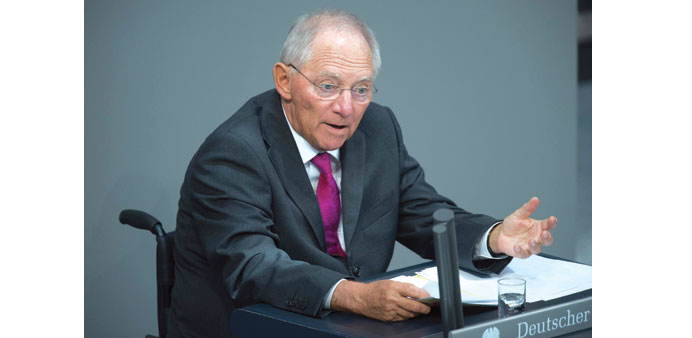German Finance Minister Wolfgang Schaeuble addresses deputies at the Lower House of Parliament Bundestag in Berlin yesterday, in a preliminary hearing on the government’s 2015 budget. Schaeuble insisted it was up to each country to do its reform “homework” and played down the benefits of more public investment.
Finance minister says each country must do its homework; says calls for higher deficits are misleading; Germany under pressure from eurozone peers to spend more; wants to open door to more private investment
German Finance Minister Wolfgang Schaeuble rebuffed calls for Berlin to spend more to boost the eurozone economy, telling parliament yesterday that painful structural reforms were the best way to return Europe to growth.
Germany is under growing pressure from partners like France and Italy to loosen the fiscal reins and use its overflowing government coffers to ramp up public investment.
Worried about the risks of Japan-like deflation, the European Commission, International Monetary Fund and European Central Bank President Mario Draghi are now urging the same.
But in a budget speech to the Bundestag lower house of parliament, Schaeuble insisted it was up to each country to do its reform “homework” and played down the benefits of more public investment.
“We mustn’t allow ourselves to entertain the illusion that we can solve our problems using more and more public funds and ever higher deficits,” he said.
“Calls in Europe to use ever more public funds and higher deficits and debts are misleading. Growth and jobs are not created through ever higher deficits — otherwise we would have no problems now.”
The comments come against a backdrop of rising concerns in Germany itself about the state of the domestic economy, which some economists argue is beginning to show cracks from a decade of underinvestment in roads, bridges, factories and schools.
The cover of the most recent issue of German weekly Der Spiegel pictured shiny German cars, homes and skyscrapers perched precariously on a rotting foundation under the headline “The Crumbling State”.
Statistics show that total annual investment levels in Germany are currently around 17% of GDP — below the average of roughly 21% in other industrialised countries.
In response, both Schaeuble and Economy Minister Sigmar Gabriel have been exploring ways to encourage the German private sector to invest more. Schaeuble is also expected to present joint proposals on boosting investment with his French counterpart Michel Sapin at a meeting of European finance minister in Milan later this week.
But it was clear from his comments in the Bundestag that Schaeuble is unlikely to abandon the aggressive budget goals agreed by German Chancellor Angela Merkel’s “grand coalition” last year.
Under the “debt brake” it wrote into its constitution in 2009, the federal government is obliged to cut its structural deficit to no more than 0.35% of gross domestic product by 2016.
Emboldened by a surging tax take and low borrowing costs however, the ruling parties vowed in December to consolidate even faster — achieving a structurally balanced federal budget in 2014, roughly two years faster than the debt brake requires. For the first time since 1969, Germany will also refrain from new borrowing next year, Schaeuble said.
If the full flexibility that is built into the debt brake were used, state bank KfW estimates that the federal government and municipalities could invest €150bn more than currently planned through 2018 and still not violate the law.
But Merkel and Schaeuble have made clear the strict new targets must be met for Berlin to be set a credible example for the rest of Europe.
“Germany has ample financial room to spend more, and a boost in public investment would help the domestic as well as the European economy,” said Christian Odendahl, chief economist at the Centre for European Reform.
“But the chances of any substantial stimulus look slim. Overachieving on budget consolidation has become something of a religion in Berlin,” he added.
In his speech Schaeuble said the ECB, which cut interest rates to record lows last week and unveiled an asset purchase programme, had run out of options for boosting growth.
“It’s no good to hold the central bank responsible for growth and jobs — it’s doing what it can but it has basically exhausted its tools, as you can see from current developments,” he said, adding that cheap money would not lead to growth.
Instead, Schaeuble said it was crucial that countries rigorously implement agreements they had made on budget consolidation and structural reforms.
Draghi also said last week that governments should use existing flexibility within the eurozone’s debt rules, rather than break them, in order to help pursue structural economic reforms needed to revive growth.
While not committing to any more public investment, Schaeuble said Berlin wanted to open the door to more private investment, saying Germany needed to look into new types of public-private partnerships. He suggested user-financed projects would be a good idea for the transport sector.
Schaeuble said the government also wanted to examine ways to get insurance companies and pension funds to invest in the financing of infrastructure projects. But the opposition Greens and Left parties attacked his budget for failing to address the problem of dwindling infrastructure spending.
“The budget has a polished, glossy facade but behind that it’s completely crumbling,” said Sven-Christian Kindler, budget expert for the Greens.

